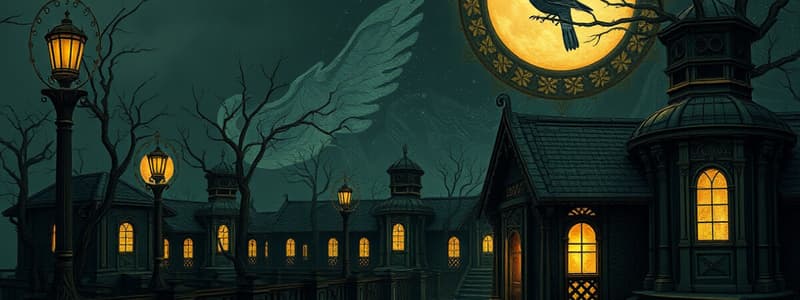Podcast
Questions and Answers
What does Elie never forget about his first night in camp?
What does Elie never forget about his first night in camp?
The smoke, the small faces of the children, the flames that consumed his faith, the nocturnal silence, and the moments that murdered his God and soul.
What does Moishe the Beadle pray for?
What does Moishe the Beadle pray for?
The strength to ask God the real questions.
Where will Eliezer find the real answers according to Moishe the Beadle?
Where will Eliezer find the real answers according to Moishe the Beadle?
Within himself.
What does Elie hear in response to the man asking 'Where is God?'
What does Elie hear in response to the man asking 'Where is God?'
What was Elie's observation about the French girl?
What was Elie's observation about the French girl?
What did Elie say about the other invalids beating his dying father?
What did Elie say about the other invalids beating his dying father?
What does Elie's 'faceless neighbour' express about Hitler?
What does Elie's 'faceless neighbour' express about Hitler?
What was Elie's impression of the young Pole in charge of his block?
What was Elie's impression of the young Pole in charge of his block?
What did the living feel when throwing dead bodies off the train?
What did the living feel when throwing dead bodies off the train?
What imagery is used to describe men fighting over bread on the train?
What imagery is used to describe men fighting over bread on the train?
What did Alphonse do for the young and weak?
What did Alphonse do for the young and weak?
Flashcards are hidden until you start studying
Study Notes
Elie Wiesel - Night - Key Quotes and Their Context
- Powerful expression of trauma: "Never shall I forget" underscores Elie's emotional scars from the first night in Auschwitz, depicting sights and experiences that obliterated his faith and hope.
- Elie prays for the strength to confront profound questions about existence, reflecting an internal struggle with faith and understanding amidst suffering.
- Moishe the Beadle imparts wisdom to Elie, suggesting that true understanding comes from introspection rather than external sources, emphasizing self-discovery in dire circumstances.
- A haunting moment where Elie witnesses a fellow inmate's despair, leading him to the grim realization of God's perceived absence in moments of extreme suffering.
- Observing fear in the French girl demonstrates Elie's perception of human emotion in a dehumanizing environment, highlighting the complexities of human connection under oppression.
- Elie's reflection on his father's mistreatment reveals deep anguish, illustrating the erosion of familial bonds and the brutal reality of survival in concentration camps.
- A disturbing commentary on misplaced faith, illustrated by the neighbor's reliance on Hitler, showcases the depths of despair and broken promises felt by Jewish people during the Holocaust.
- Initial warmth from a Polish inmate contrasts sharply with subsequent cruelty, emphasizing a fleeting sense of humanity amidst pervasive brutality.
- A chilling observation of apathy towards death illustrates the moral decay and loss of empathy among the living, prioritizing survival over compassion.
- Vivid imagery of desperation: men fighting over scarce food portrays the degradation of humanity and the instinct for survival amid scarcity.
- Alphonse stands as a figure of resistance against dehumanization, striving to provide sustenance for the weak, representing small acts of kindness in desperate times.
Studying That Suits You
Use AI to generate personalized quizzes and flashcards to suit your learning preferences.




